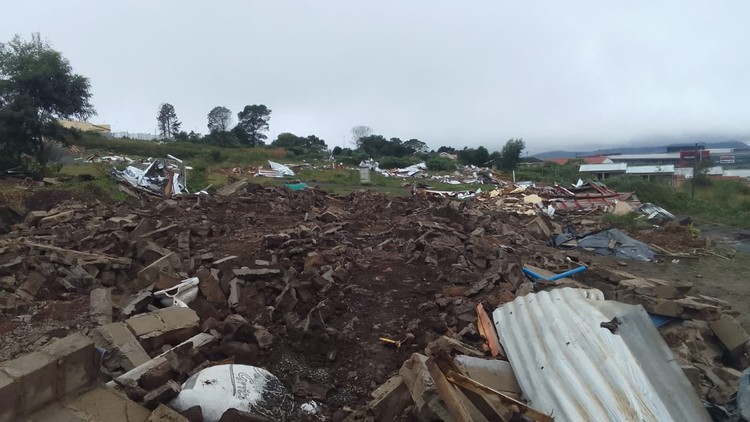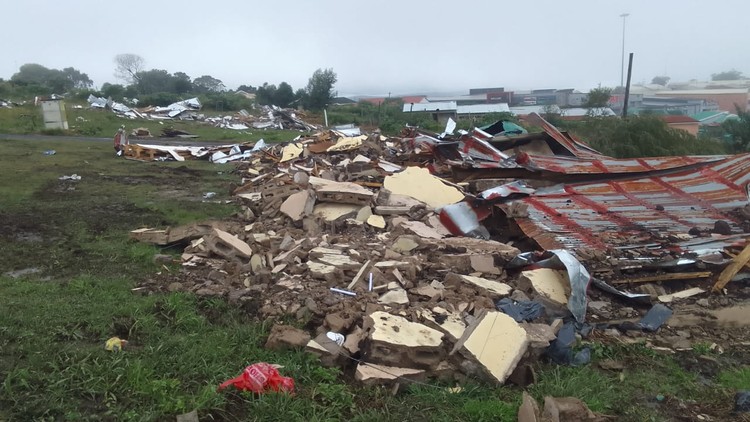Chaos in Flagstaff as municipality demolishes homes ‘sold’ by chief
Municipality says property is earmarked for development
Families living on land owned by the Ingquza Hill Local Municipality had their homes and businesses demolished on Good Friday. Photos: Yamkela Ntshongwana
- On Good Friday, the Ingquza Hill Local Municipality ordered the demolition of about 200 homes in Enkululekweni, Flagstaff.
- Residents claim they had bought some of the plots from the village chief years ago and were confused when their homes were demolished.
- But the municipality says the land belongs to them.
- The eviction is currently before a court. In the meantime, many of the residents have been rendered homeless.
About 200 families whose homes were demolished on land in Enkululekweni, Flagstaff over the Easter weekend are embroiled in a legal battle with the municipality.
Families now living with friends and family in a neighbouring village told GroundUp that most of them had first moved onto the land between 2016 and 2018.
They believe that part of the land belongs to the local chief while a portion belongs to the Ingquza Hill Local Municipality.
While there are no records, most residents say they bought their plots from chief Diliza Ndabankulu. Some bought sites to build themselves brick houses, while others used the plots to start businesses.
In October 2021, the municipality obtained a court order to demolish the occupiers’ structures and issued a notice to residents. Then in 2024, the municipality obtained a new court order directing residents to leave the property.
On 18 April this year, Good Friday, residents were evicted and structures destroyed by the municipality.
Ingquza Hill Local Municipality spokesperson Lwando Nonkonyane said that the court order allows for the removal of unauthorised structures from its land, including houses, trading stalls or containers.
Nonkonyne disputed claims that residents had not been informed that they needed to move before the properties were demolished. “On Wednesday, 16 April 2025, the municipality officially started the process of assisting those who could vacate voluntarily.”
“The process is unfolding, and people are urged to remove their structures themselves before the process gets to them,” said Nonkonyane
He said the municipality “takes no pride in removing unauthorized structures” but it is an inevitable measure to protect the land and ensure it can be used for future development.
“This action is part of our ongoing efforts to enforce municipal bylaws and ensure public safety. The municipal message is clear: to keep our town clean and safe, and to attract as many investors as possible. This will improve the lives of our people,” Nonkonyana told GroundUp.
The residents did not oppose the 2021 or 2024 eviction orders in court. But in April, Lawyer Duma Mjobo was hired to fight the eviction on behalf of the residents.
He said that during an urgent hearing last month, the court requested that the occupiers and the municipality submit documents with clear demarcations showing land ownership in Enkululekweni.
The matter is expected to return to court once the municipality has sent out its surveyors, but the lawyer says he has not yet been hired to defend the occupiers at the next hearing.
Many people said they used their savings to build brick houses for their families on land they claim was bought from the local chief.
Confusion over land ownership
Resident Vuyelwa Ngqasa explained that the battle over the land started several weeks ago after word spread that the municipality plans to use the land for a new development.
She said issues started in March when a group of young men, armed with sticks and axes, came out in numbers. Petrol bombs were thrown, and public order police responded with tear gas to disperse the protesters. Some structures were burnt by the unknown vandals during this protest.
Ngqasa said the vandals were shouting that the land belonged to their forefathers. Village chief Ndabankulu was called to intervene and he held a meeting on 28 March with the community and municipal officials.
“To our surprise, the municipal officials were the ones talking the most, telling us that the land belongs to them and that we occupied it illegally. We tried to plead with the municipality, telling them that we bought those sites, but they refused to listen to us,” said Ngqasa.
“I paid R40,000 for my plot but the officials didn’t care, they kept telling us that they have a court order,” said Ngqasa. “I told them I have four kids and this is their only home. I used my last cent to buy the site, and I don’t want my kids to end up like me with no home,” she said.
Another resident Vusumzi Dingezweni described the chaos when officials arrived to demolish the structures. He said the flats he built on the plot he paid R20,000 for years ago were also destroyed. He survived on the money he received from the rentals.
“The eviction happened on a public holiday; some people were in church. Everything happened so fast. We had to watch them destroy our hard work,” he said.
We asked chief Diliza Ndabankulu about the residents’ claims that he had accepted money in exchange for the plots. He told GroundUp on the phone that he can’t comment on the matter until the court proceedings were over and ended the call.
Last week, some occupiers marched to the municipal offices to demand compensation for their belongings destroyed during the eviction. The municipality also confirmed that municipal manager Velile Makedama had received threats since the process started, which have been reported to authorities.
Support independent journalism
Donate using Payfast

Don't miss out on the latest news
We respect your privacy, and promise we won't spam you.
Next: Gauteng welfare organisations worried about late payments
Previous: Universal access to trains: Metrorail’s empty promises
© 2025 GroundUp. This article is licensed under a Creative Commons Attribution-NoDerivatives 4.0 International License.
You may republish this article, so long as you credit the authors and GroundUp, and do not change the text. Please include a link back to the original article.
We put an invisible pixel in the article so that we can count traffic to republishers. All analytics tools are solely on our servers. We do not give our logs to any third party. Logs are deleted after two weeks. We do not use any IP address identifying information except to count regional traffic. We are solely interested in counting hits, not tracking users. If you republish, please do not delete the invisible pixel.


